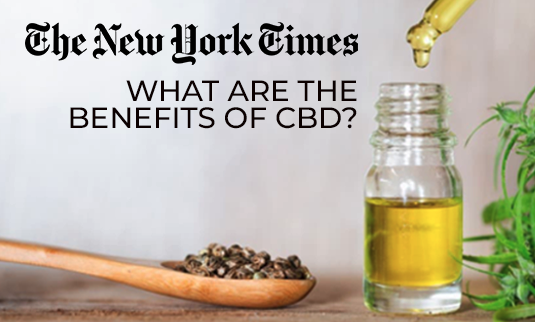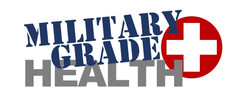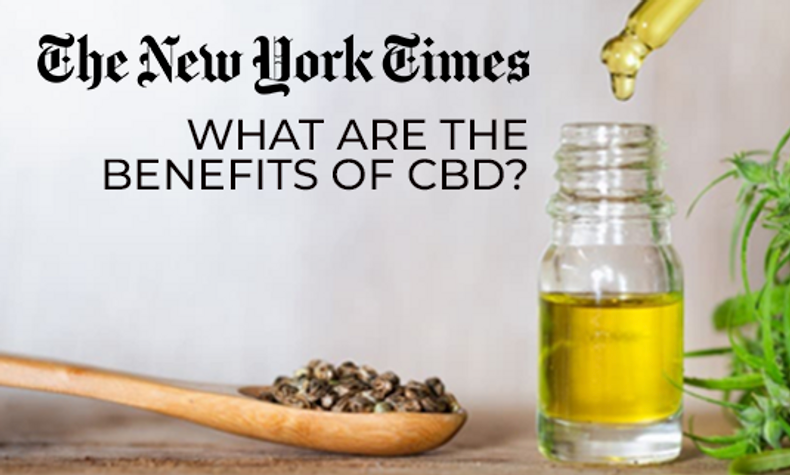
By Dawn MacKeen
The CBD industry is flourishing, conservatively projected to hit $16 billion in the United States by 2025. Already, the plant extract is being added to cheeseburgers, toothpicks and breath sprays. More than 60 percent of CBD users have taken it for anxiety, according to a survey of 5,000 people, conducted by the Brightfield Group, a cannabis market research firm.Chronic pain, insomnia and depression follow behind. Kim Kardashian West, for example, turned to the product when “freaking out” over the birth of her fourth baby. The professional golfer Bubba Watson drifts off to sleep with it. And Martha Stewart’s French bulldog partakes, too.
What are the claims?
CBD is advertised as providing relief for anxiety, depression and post-traumatic stress disorder. It is also marketed to promote sleep. Part of CBD’s popularity is that it purports to be “nonpsychoactive,” and that consumers can reap health benefits from the plant without the high (or the midnight pizza munchies).
Just as hemp seedlings are sprouting up across the United States, so is the marketing. From oils and nasal sprays to lollipops and suppositories, it seems no place is too sacred for CBD. “It’s the monster that has taken over the room,” Dr. Brad Ingram, an associate professor of pediatrics at the University of Mississippi Medical Center, said about all the wild uses for CBD now. He is leading a clinical trial into administering CBD to children and teenagers with drug-resistant epilepsy.
Does CBD work?
“It’s promising in a lot of different therapeutic avenues because it’s relatively safe,” said James MacKillop, co-director of McMaster University’s Michael G. DeGroote Center for Medicinal Cannabis Research in Hamilton, Ontario.
Last year, the F.D.A. approved Epidiolex, a purified CBD extract, to treat rare seizure disorders in patients 2 years or older after three randomized, double-blind and placebo-controlled clinical trials with 516 patients that showed the drug, taken along with other medications, helped to reduce seizures. These types of studies are the gold standard in medicine, in which participants are divided by chance, and neither the subject nor the investigator knows which group is taking the placebo or the medication.
While there is hope for treating other conditions with the plant extract, Epidiolex remains the only CBD-derived drug approved by the F.D.A. Most of the research on cannabidiol has been in animals, and its current popularity has outpaced science.“We don’t have the 101 course on CBD quite figured out yet,” said Ryan Vandrey, an associate professor of psychiatry and behavioral sciences at Johns Hopkins University School of Medicine.
Does CBD help anxiety and PTSD?
For students with generalized social anxiety, a four-minute talk, with minimal time to prepare, can be debilitating. Yet a small experiment in the journal Neuropsychopharmacology found that CBD seemed to reduce nervousness and cognitive impairment in patients with social anxiety in a simulated public speaking task.
Many soldiers return home haunted by war and PTSD and often avoid certain activities, places or people associated with their traumatic events. The Department of Veterans Affairs is funding its first study on CBD, pairing it with psychotherapy.
“Our top therapies attempt to break the association between reminders of the trauma and the fear response,” said Mallory Loflin, an assistant adjunct professor at the University of California, San Diego and the study’s principal investigator. “We think that CBD, at least in animal models, can help that process happen a lot faster.”
Does CBD help sleep and depression?
Up in the wee hours of the night, stuck watching videos of puppies? CBD may be promising as a sleep aid; one of the side effects of the Epidiolex trials for epilepsy was drowsiness, according to Mr. MacKillop, a co-author of a review of of cannabinoids and sleep. “If you are looking for new treatments for sleep, that may be a clue,” he said the children were taking CBD to control the seizures. So far, there hasn’t been a randomized, placebo-controlled, double-blind trial (the gold standard) on sleep disorders and CBD.
So without clinical trials in humans, psychologists say CBD’s effect on depression and sleep is still a hypothesis,and not an evidence-based treatment.
Is CBD harmful?
“If you take pure CBD, it’s pretty safe,” said Marcel Bonn-Miller, an adjunct assistant professor at the University of Pennsylvania’s Perelman School of Medicine. Side effects in the Epidiolex trial included diarrhea, sleepiness, fatigue, weakness, rash, decreased appetite and elevated liver enzymes. Also, the safe amount to consume in a day, or at all during pregnancy, is still not known.
Some CBD products may contain unwanted surprises. You want to make sure the CBD is pure CBD and no additives.
Earlier research found fewer than a third of 84 products studied contained the amount of CBD on their labels. Some users of CBD have also failed drug tests when the product contained more THC than indicated. All products should have a certificate of analysis to ensure the label is accurate.
Is CBD a scam or not?
“CBD is not a scam,” said Yasmin Hurd, director of the Addiction Institute of Mount Sinai in New York City who led a double-blind study of 42 recovering heroin addicts and found that CBD reduced both cravings and cue-based anxiety, both of which can cycle people back into using. “It has a potential medicinal value, but when we are putting it into mascara and putting it into tampons, for God’s sake, to me, that’s a scam.”



